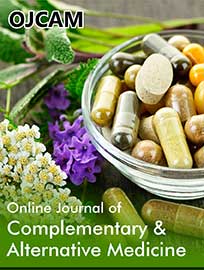 Research Article
Research Article
Clinical and In-Silico study of COVID‑19 patients using Thymus capitatus extract as adjuvant Therapy
Abdul M Gbaj1*, Inass A Sadawe1, Nisreen H Meiqal1, Salah M Bensaber1, Abdulhakim M Qabaj2, Abdulhamid R Hamid3, Massaud Salem Maamar4 and Anton Hermann5
1Department of Medicinal Chemistry, Faculty of Pharmacy, University of Tripoli, Libya
2Arada polylinic, Arada, Tripoli Libya
3Judicial Expertise and Research Centre, Tripoli, Libya
4Zoology Department, Faculty of Science, Tripoli University, Libya
5Department of Biosciences, University of Salzburg, Salzburg, Austria
Abdul M Gbaj, Professor of Genetics and Biochemistry, Department of Medicinal Chemistry, Faculty of Pharmacy, University of Tripoli, Libya.
Received Date: December 31, 2020; Published Date:February 08, 2021
Abstract
Thymus capitatus extract has been considered a promise as antiviral agent against COVID‑19 viruses. We hypothesized that Thymus capitatuscomponents may interact with key protein targets of COVID‑19 (coronavirus 2 (SARS-CoV-2) causing severe acute respiratory syndromes. Molecular docking analysis was carried out using 31 components of Thymus capitatus with SARS-CoV-2 protease enzyme (6LU7) and spike glycoprotein (6VSB). The compounds with the best normalized docking scores to protease enzyme were allo-Aromadendrene (-6.3 kcal/mole), spathulenol (-6.6 kcal/mole) and ledene (-6.8 kcal/mole). The best docking ligands for spike glycoprotein were allo-Aromadendrene (-6.6 kcal/ mole), spathulenol (-6.6 kcal/mole) and ledene (-7.3 kcal/mole). All Thymus capitatus components may act synergistically to produce the therapeutic action. Thymus capitatus components may potentiate the effect of prednisolone, azithromycin and other medicines used to treat COVID-19 patients.
Keywords:COVID-19; corona virus; molecular docking; antiviral; Thymus capitatus
-
Abdul M Gbaj, Inass A Sadawe, Nisreen H Meiqal, Salah M Bensaber. Clinical and In-Silico study of COVID‑19 patients using Thymus capitatus extract as adjuvant Therapy. On J Complement & Alt Med. 5(4): 2021. OJCAM.MS.ID.000620.





